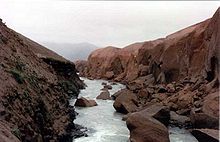- Lethe
-
For other uses, see Lethe (disambiguation).
Greek underworld Residents Geography - Erebus
- Lethe
- Phlegethon
- Styx
- Tartarus
Famous inmates Visitors In Greek mythology, Lethe (Λήθη, Lēthē; Classical Greek [lɛː́tʰɛː], modern Greek: [ˈliθi]) was one of the five rivers of Hades. Also known as the Ameles potamos (river of unmindfulness), the Lethe flowed around the cave of Hypnos and through the Underworld, where all those who drank from it experienced complete forgetfulness. Lethe was also the name of the Greek spirit of forgetfulness and oblivion, with whom the river was often identified.
In Classical Greek, the word Lethe literally means "oblivion", "forgetfulness," or "concealment". It is related to the Greek word for "truth", aletheia (ἀλήθεια), meaning "un-forgetfulness" or "un-concealment".
Contents
Mythology
River
Lethe (lee-thee), the river of forgetfulness, was one of the five rivers of the Greek underworld, the other four being Styx (the river of hate), Akheron (the river of sorrow), Kokytos (the river of lamentation) and Phlegethon (the river of fire). According to Statius, it bordered Elysium, the final resting place of the virtuous. Ovid wrote that the river flowed through the cave of Hypnos, god of sleep, where its murmuring would induce drowsiness.[1]
The shades of the dead were required to drink the waters of the Lethe in order to forget their earthly life. In the Aeneid, Virgil writes that it is only when the dead have had their memories erased by the Lethe that they may be reincarnated.[2]
Goddess
Lethe was also the name of the personification of forgetfulness and oblivion, with whom the river was often associated. Hesiod's Theogony identifies her as the daughter of Eris ("strife") , Ponos ("toil"), Limos ("starvation"), the Algea ("pains"), the Hysminai ("fightings"), the Makhai ("battles"), the Phonoi ("murders"), the Androktasiai ("man-slaughters"), the Neikea ("quarrels"), the Pseudologoi ("lies"), the Amphilogiai ("disputes"), Dysnomia ("lawlessness"), Atë ("ruin"), and Horkos ("oath").[3]
Role in religion and philosophy
Some ancient Greeks believed that souls were made to drink from the river before being reincarnated, so they would not remember their past lives. The Myth of Er at the end of Plato's Republic tells of the dead arriving at the "plain of Lethe", through which the river Ameles ("careless") runs. A few mystery religions taught the existence of another river, the Mnemosyne; those who drank from the Mnemosyne would remember everything and attain omniscience. Initiates were taught that they would receive a choice of rivers to drink from after death, and to drink from Mnemosyne instead of Lethe. These two rivers are attested in several verse inscriptions on gold plates dating to the 4th century BC and onward, found at Thurii in Southern Italy and elsewhere throughout the Greek world. There were rivers of Lethe and Mnemosyne at the oracular shrine of Trophonius in Boeotia, from which worshippers would drink before making oracular consultations with the god. More recently, Martin Heidegger used "lēthē" to symbolize the "concealment of Being" or "forgetting of Being" that he saw as a major problem of modern philosophy. Examples are found in his books on Nietzsche (Vol 1, p. 194) and on Parmenides.
Real rivers
Amongst authors in Antiquity, the tiny Limia River between Northern Portugal and Galicia (Spain) was said to have the same properties of memory loss as the legendary Lethe River. In 138 BC, the Roman general Decimus Junius Brutus sought to dispose of the myth, as it impeded his military campaigns in the area. He was said to have crossed the Limia and then called his soldiers on the other side, one by one, by name. The soldiers, astonished that their general remembered their names, crossed the river as well without fear. This act proved that the Limia was not as dangerous as the local myths described. In Alaska, a river which runs through the Valley of Ten Thousand Smokes is called River Lethe.
See also
- Oblivion (eternal)
- River Lethe in popular culture
- The Golden Bough (mythology)
References
- ^ "LETHE : Greek goddess of the underworld river of oblivion ; mythology". http://www.theoi.com/Khthonios/PotamosLethe.html. Retrieved 02-06-2010.
- ^ Day-Lewis, Cecil (trans.) (1952). Virgil's Aeneid. pp. 705.
- ^ Hesiod (author); Evelyn-White, H.G. (trans.) (1914). The Theogony of Hesiod. pp. 226. http://www.theoi.com/Text/HesiodTheogony.html.
External links
Categories:- Greek goddesses
- Greek mythology
- Rivers of Hades
- Naiads
Wikimedia Foundation. 2010.

